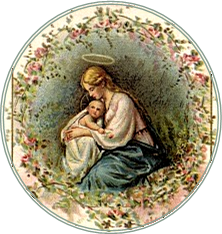
There was a faint and feeble knock at the door of life. Louder and more insistent it grew. Opening the door, the angel of life saw a woman, pale with pain, but with a sparkle of expectant hope in her eye.
"I have come for my child," she said eagerly. "Give it to me quickly. I have come a long way and a hard way. My strength may not last until I return."
"Just a moment," answered the angel slowly. "Your child is here—a beautiful boy. But you must pay for him."
"Pay for him?" echoed the visitor. "My husband and I have very little money. What little we have we will need for the baby."
"It is not money I want," explained the angel. "But I must be paid. I must have some of your health, good woman. I must have a great deal of your time, practically all of it for a few years. You must pay a great deal of your energy, your comfort, much of your peace of mind, and a great portion of your heart."
Without a moment's hesitation the waiting woman handed over all these priceless things. The angel disappeared behind the door of life, to reappear with a wriggling bundle. Eagerly, almost violently the woman clutched him in her feeble arms, thanked the angel, and fearlessly set out for this earth. As the woman turned to leave, the angel gently placed on her head a crown. The lady expressed surprise.
"This is my gift to you," explained the angel of life. "This is the crown of motherhood. This is your reward for the many things you have given up."
The Crown of Motherhood! Who could ever count up its cost? We set aside the second Sunday of every May to place that precious diadem on the head of everyone, living and dead, who has given life to another. Most mothers are too busy to wear that crown every day. Most mothers don't want continual praise and attention. But every mother appreciates at least an annual expression of our love and gratitude. So much the more sincere must it be. So much the more thoughtful, so much the more genuine and heartfelt must Mother's Day be.
Did you ever reckon what small return we make for the price mother paid for her crown? A heap of sweet and sentimental stuff is dished up about this time of year. Some of i t is sincere. But carnations, cards, and candy seem so worthless, so weak beside the flesh and blood things mother has given to us. If we could only give her back something of ourselves, something of our time and energy, nay, some of our very blood, some of our very life.
The tremendous difference between what mothers do for their children, and what children do for their mothers was emphasized for me several years ago while traveling by train west out of Kansas City. Because of scarcity of seats a young mother had to hold on her lap her bouncing fifteen-month old boy. Perpetual motion of the baby; perpetual care of the mother. How her arms must have ached; how her limbs must have pained; how her neck must have twitched with stiffness. Every power of mind as well as of body was devoted to that child. Not a moment's rest, not a moment's quiet. Even as he slept there was the tension of tender care. There one saw what mothers do.
Let us now see what some children do. Sitting beside me was another mother, one, I should judge, between fifty-five and sixty years of age. As usual, my Roman collar invited conversation, although she was not a Catholic. In the course of our talk she told me of her family and children. But there was a tearful note in her proud story. One married son living on a farm in Nebraska had not written her a line, nor paid her a visit, nor made a phone call to her in over two years. The ingrate, the thankless wretch—knowingly or unknowingly such— the ingrate would not give a few moments of time to the one who had given all the moments of many years to him.
No wonder we have Mother's Day.
And no wonder the most loving Son who ever lived thought of His Mother, and provided for her, despite the terrible torture of His dying moments. He was more concerned for her than He was for Himself. His throat was parched, His tongue heavy, His lips bloody, but Jesus knew what the crown of motherhood had cost her. And remembering, He would make some return. He told St. John, He told you and me:
"Behold thy mother."
Respect and reverence and thoughtfulness and gratitude toward our mothers is an all-year and an all-life duty. Mother's Day points up that obligation. Mother's Day gives us a reminder and an opportunity to think of what our heavenly and our earthly mother have done for us, and to render some gift or word of thanks. Yes, "Behold thy mother," your earthly mother and your heavenly Mother, and as we crown them both this May, keep in mind the cost of their crowns. Amen.
Source: Feasts of our Lady, Imprimatur 1952


 RSS Feed
RSS Feed